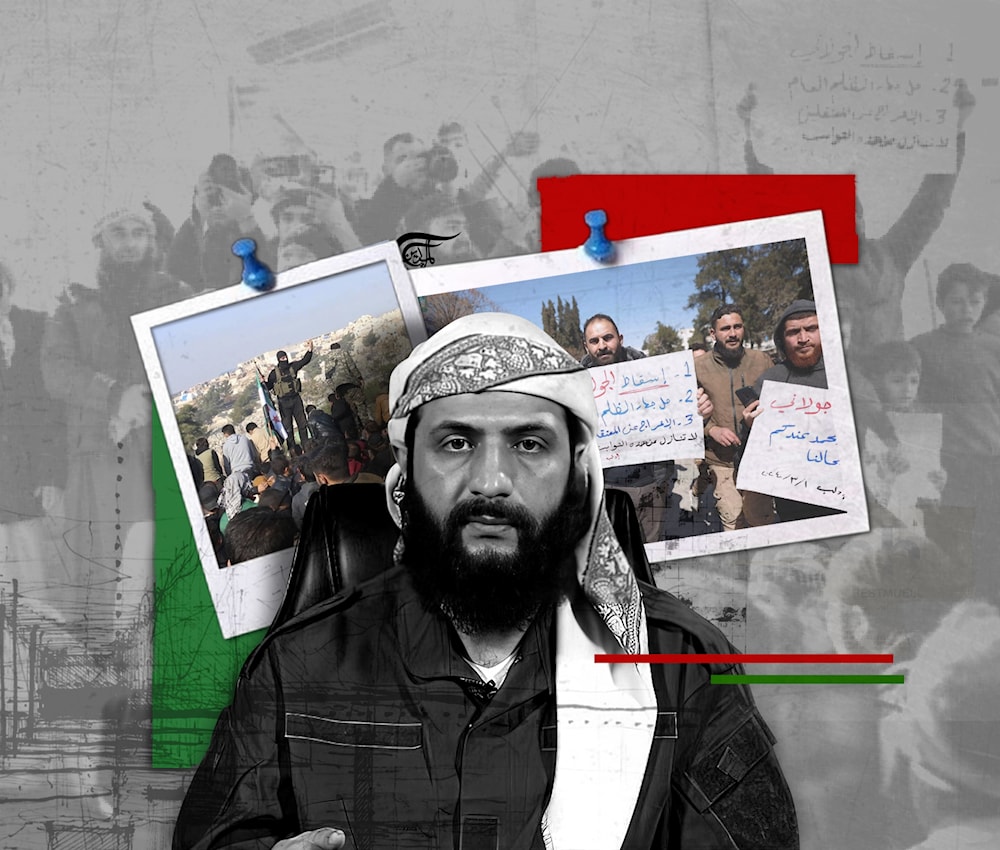Idlib, the 'emirate' that began to shake from within
The arrest campaign carried out by Abu Muhammad al-Jolani during the recent period was “to get rid of his potential rivals.”
-

Anti-Jolani protests will not end soon (Illustrated by Zeinab al-Hajj; Al Mayadeen English)
For weeks, Idlib has witnessed demonstrations that have reached a record level in terms of the number of participants and demands that are no longer limited only to “holding accountable and excluding the security services affiliated with Hayat Tahrir al-Sham (HTS) and cleaning prisons and revealing the fate of the forcibly disappeared," rather it extended to include “demanding the overthrow of al-Jolani, ending the rule of HTS, and replacing it with a civil administration."
The killing of a member of the 'Jaysh al-Ahrar'; faction under torture, sparked the demonstrations
Last year, HTS began investigations into the so-called “agent’s case”, as it launched a massive arrest campaign that targeted hundreds of members and a number of leaders in the organization, some of them on charges of working for the CIA and others on charges of working for Russia and the Syrian government.
The most important of these detainees was “Abu Maria Al-Qahtani” (Iraqi national), the former deputy of Al-Jolani and one of the most prominent leaders and founders of the “al-Nusra Front”, who was recently released after “his acquittal”.
Local sources suggested that the arrest campaign carried out by Abu Muhammad al-Jolani during the recent period was “to get rid of his potential rivals.”
But the spark that ignited popular anger was the killing of Abdul Qadir al-Hakim, known as “Abu Ubaida” from the “Jaysh al-Ahrar” faction, who was killed in prison under torture and then buried in the Aleppo countryside.
These demonstrations were expected for many reasons
The outbreak of the current demonstrations against HTS was not surprising but was expected due to the exacerbation of several factors, the first of which is the continued deterioration of living conditions in northern Syria.
According to international statistics, the percentage of the population below the poverty line reaches about 90%, at a time when HTS controls all local resources, and its “Salvation Government” takes control of the international aid arriving through the Bab al-Hawa crossing and distributes it at its own discretion and in a way that serves the interests of officials, according to local sources.
This aid is constantly decreasing due to the decline in funding from donor countries, especially the US and the EU countries, who are busy confronting Russia in Ukraine and providing their support to "Israel" in the war of genocide it is waging against the Palestinians in Gaza.
In parallel, popular dissatisfaction has increased in the recent period due to the repression practiced by HTS security forces, not only against residents who oppose them but also against citizens who live in the camps who protest their continued suffering in obtaining water, electricity, and hospitalization.
It is noteworthy that the lines of contact between the areas where terrorist factions are deployed in Idlib and the areas controlled by the Syrian army have become heated recently.
The terrorists carried out multiple “marauding operations” and launched suicide drones that attempted to target the Syrian army, which announced in several statements that it shot down all of them, eliminated the infiltrators, and arrested one of them in the southern countryside of Idlib.
Why has Turkey not yet commented on what is happening?
According to observers, it is unlikely that these protests will end soon or that people will calm down after they were exposed to violence and after al-Jolani threatened them with the continued use of excessive force.
But what is really striking is Turkey's silence or non-intervention so far, which may indicate that it thinks that “weakening HTS would be in its interest because the stage needs more flexible organizations, and that’s why it views these demonstrations as serving its direction in one way or another.”
The HTS (formerly al-Nusra Front) is classified as a terrorist organization by the United Nations and many countries, including Russia.
This terrorist organization includes a large number of foreign fighters, whose number exceeds 8,000 fighters in Idlib, 6500 of whom are Uyghurs, Caucasians, Tajiks, and Chechens, while Arabs, most of whom are from North Africa, hold administrative, security, and military positions.

 Sara Salloum
Sara Salloum
 4 Min Read
4 Min Read











